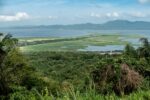The umbrella organization of Philippine employers called for a more balanced and inclusive representation of all the sectors to be affected by the proposed P150 across-the-board minimum wage hike, asking that micro, small and medium enterprises (MSMEs) as well as informal workers also be allowed to have their say, not just the formal workforce.
Sergio R. Ortiz-Luis Jr., president of the Employers Confederation of the Philippines (ECOP), said in a May 4 interview with radio station DWIZ that employers understand the plight of workers struggling to cope with high inflation.
However, they don’t see how the legislated big wage hike proposed by Senate President Juan Miguel Zubiri can benefit MSMEs, which barely make a profit, and informal workers, who have no employer to increase their salaries.
“Naiintindihan naman namin na hirap na hirap ang mga tao at sabi nga ni Senate President Zubiri maraming malalaking kumpanya ang masyadong malalaki ang kita,” Ortiz-Luis said.
But he argued that the large firms capable of paying the wage increase only make up less than 2% of all Philippine companies, as more than 98% are MSMEs, which are the biggest providers of jobs in the formal sector. These MSMEs, he recalled, were so badly affected by the pandemic that half were forced to close and many remain shuttered to this day.
In addition, Ortiz-Luis said, only 10% of the 50 million in the labor market are formal minimum wage earners, while the remaining 90% have no employer. These 90% are comprised of informal workers such as fisherfolk, farmers, public transport drivers, and the underemployed, all of whom are not going to benefit from the legislated wage hike.
“Unfortunately hindi sila kasama sa pagtataas dahil sinong magbabayad ng P150 sa farmer? O ang fisherman, sino magbibigay sa kanya ng P150?” he pointed out.
“Alam ko kailangan ng mga tao iyan pero sinasabi ko lang i-consider nyo ang iba. Paano natin babalansehin ung bibigyan mo ng [increase tapos] tataas ang bilihin?” He said the 10% have additional income but not the 90%.
He further warned of the potential repercussions of such a legislative proposal, no matter how well-intentioned, noting that since the wage hike is not profit-based, companies will try to offset the higher payout by either raising prices or shedding workers.
“Kung kaya pa ng produkto nila, tataasan nila ang presyo. Kung hindi na kaya, magbabawas ng empleyado para mapagkasya nila ang pasweldo. At kung hindi na kaya talaga, magsasara,” he said.
The industry leader said the business community still prefers to have wage increase proposals tackled by the tripartite wage board where issues are carefully reviewed and all affected sectors and relevant government agencies are represented.
Ortiz-Luis said the private sector’s concern with the legislative wage hearing is that the solons might not be getting the correct or complete information and the resource persons may not have complete representation.
He stated: “Dapat siguro kunsultahin yung mga [MSMEs at] farm workers. Yung fisherman, kung nagtaas ng sweldo dadami ba ung isda niyang mahuhuli?… Paano yung market vendors, jeepney drivers, tricycle drivers? Saan nila huhugutin yun kapag tumaas pa ang presyo ng bigas, pangunahing bilihin? Hindi naman kayang sustentuhan ng gobyerno iyan.”
He also recommended including concerned agencies such as the Department of Trade and Industry, National Economic and Development Authority, and the Department of Labor and Employment as well as the tripartite wage board to ensure the accuracy of the statistics and information provided.
“Napansin ko pati impormasyon sa Kongreso mali-mali. Sinasabi mababa ang minimum wage natin dito. Hindi! Sa ASEAN pinakamataas ngayon, konting lang, ang Indonesia. Susunod ang Pilipinas, ang Thailand, pang-apat ang Malaysia…. Hindi sapat ang mga statistics nila at hindi siguro kumpleto ang groundwork para makuha lahat ng impormasyon,” he said.
In March 2023, Zubiri filed Senate Bill No. 2002 or the Across-the-Board Wage Increase Act of 2023, which seeks to raise wages in the private sector across all regions by P150.
At present, the National Capital Region has the highest daily nominal wage rate at P570 (non-agriculture), while the lowest is at P316.00 (non-agriculture) for the Bangsamoro Autonomous Region in Muslim Mindanao.
The prescription of minimum wages in the private sector falls under the ambit of the Regional Wages and Productivity Boards, but they are constrained to issue only one wage order per year, unless they declare supervening conditions.
ECOP chief seeks balanced, inclusive representation on P150 wage hike
Related Stories







